International Business Strategy: Article Analysis and Discussion Post
VerifiedAdded on 2022/09/15
|5
|1136
|18
Discussion Board Post
AI Summary
This discussion post analyzes an article on international business strategy, focusing on the relationship between multinational corporations (MNCs), subsidiary performance, and headquarters control. The review highlights the importance of the integration-responsiveness framework and the influence of headquarters uniculturalism on subsidiary performance. The student explores the contingency theory, organizational learning, and the exploration-exploitation framework within the context of MNCs. The post also discusses the challenges faced by MNCs, such as global integration pressures, and the role of strategy culture and control in enhancing subsidiary performance. The author emphasizes the need for understanding diverse customer demands and product innovation, concluding with a question about organizational learning as a behavior or strategy. The post references key articles and frameworks to provide a comprehensive understanding of the subject.
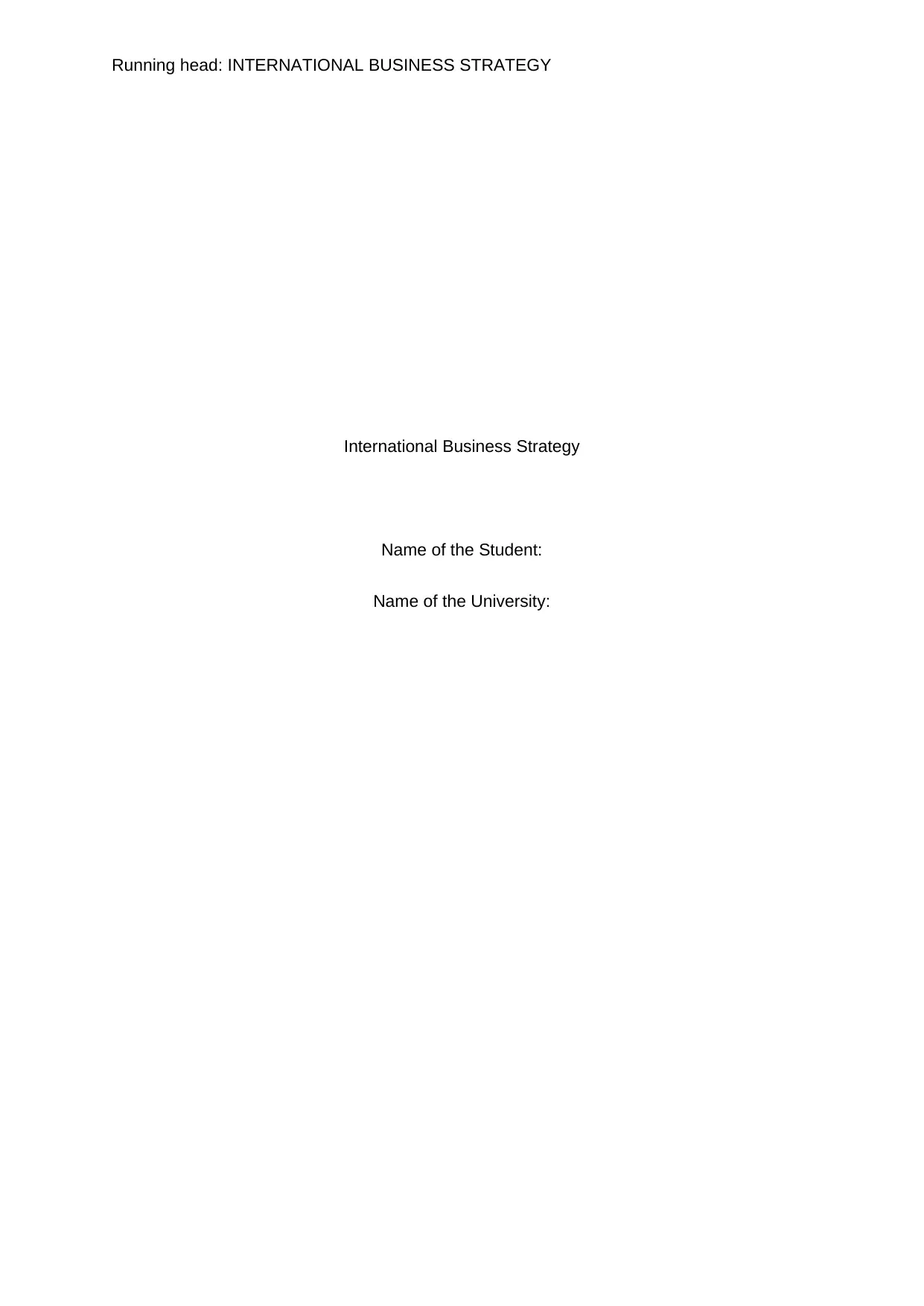
Running head: INTERNATIONAL BUSINESS STRATEGY
International Business Strategy
Name of the Student:
Name of the University:
International Business Strategy
Name of the Student:
Name of the University:
Paraphrase This Document
Need a fresh take? Get an instant paraphrase of this document with our AI Paraphraser
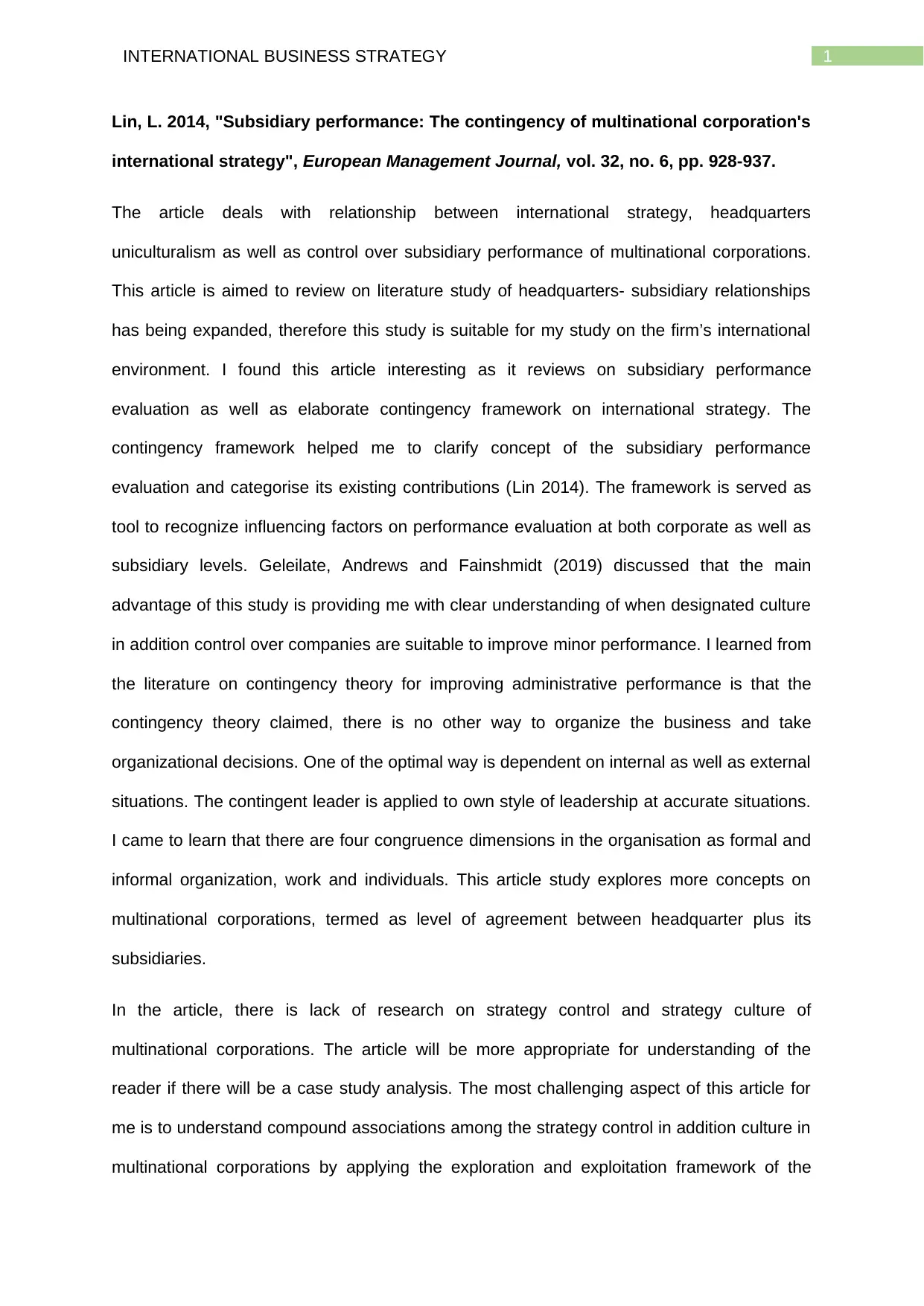
1INTERNATIONAL BUSINESS STRATEGY
Lin, L. 2014, "Subsidiary performance: The contingency of multinational corporation's
international strategy", European Management Journal, vol. 32, no. 6, pp. 928-937.
The article deals with relationship between international strategy, headquarters
uniculturalism as well as control over subsidiary performance of multinational corporations.
This article is aimed to review on literature study of headquarters- subsidiary relationships
has being expanded, therefore this study is suitable for my study on the firm’s international
environment. I found this article interesting as it reviews on subsidiary performance
evaluation as well as elaborate contingency framework on international strategy. The
contingency framework helped me to clarify concept of the subsidiary performance
evaluation and categorise its existing contributions (Lin 2014). The framework is served as
tool to recognize influencing factors on performance evaluation at both corporate as well as
subsidiary levels. Geleilate, Andrews and Fainshmidt (2019) discussed that the main
advantage of this study is providing me with clear understanding of when designated culture
in addition control over companies are suitable to improve minor performance. I learned from
the literature on contingency theory for improving administrative performance is that the
contingency theory claimed, there is no other way to organize the business and take
organizational decisions. One of the optimal way is dependent on internal as well as external
situations. The contingent leader is applied to own style of leadership at accurate situations.
I came to learn that there are four congruence dimensions in the organisation as formal and
informal organization, work and individuals. This article study explores more concepts on
multinational corporations, termed as level of agreement between headquarter plus its
subsidiaries.
In the article, there is lack of research on strategy control and strategy culture of
multinational corporations. The article will be more appropriate for understanding of the
reader if there will be a case study analysis. The most challenging aspect of this article for
me is to understand compound associations among the strategy control in addition culture in
multinational corporations by applying the exploration and exploitation framework of the
Lin, L. 2014, "Subsidiary performance: The contingency of multinational corporation's
international strategy", European Management Journal, vol. 32, no. 6, pp. 928-937.
The article deals with relationship between international strategy, headquarters
uniculturalism as well as control over subsidiary performance of multinational corporations.
This article is aimed to review on literature study of headquarters- subsidiary relationships
has being expanded, therefore this study is suitable for my study on the firm’s international
environment. I found this article interesting as it reviews on subsidiary performance
evaluation as well as elaborate contingency framework on international strategy. The
contingency framework helped me to clarify concept of the subsidiary performance
evaluation and categorise its existing contributions (Lin 2014). The framework is served as
tool to recognize influencing factors on performance evaluation at both corporate as well as
subsidiary levels. Geleilate, Andrews and Fainshmidt (2019) discussed that the main
advantage of this study is providing me with clear understanding of when designated culture
in addition control over companies are suitable to improve minor performance. I learned from
the literature on contingency theory for improving administrative performance is that the
contingency theory claimed, there is no other way to organize the business and take
organizational decisions. One of the optimal way is dependent on internal as well as external
situations. The contingent leader is applied to own style of leadership at accurate situations.
I came to learn that there are four congruence dimensions in the organisation as formal and
informal organization, work and individuals. This article study explores more concepts on
multinational corporations, termed as level of agreement between headquarter plus its
subsidiaries.
In the article, there is lack of research on strategy control and strategy culture of
multinational corporations. The article will be more appropriate for understanding of the
reader if there will be a case study analysis. The most challenging aspect of this article for
me is to understand compound associations among the strategy control in addition culture in
multinational corporations by applying the exploration and exploitation framework of the
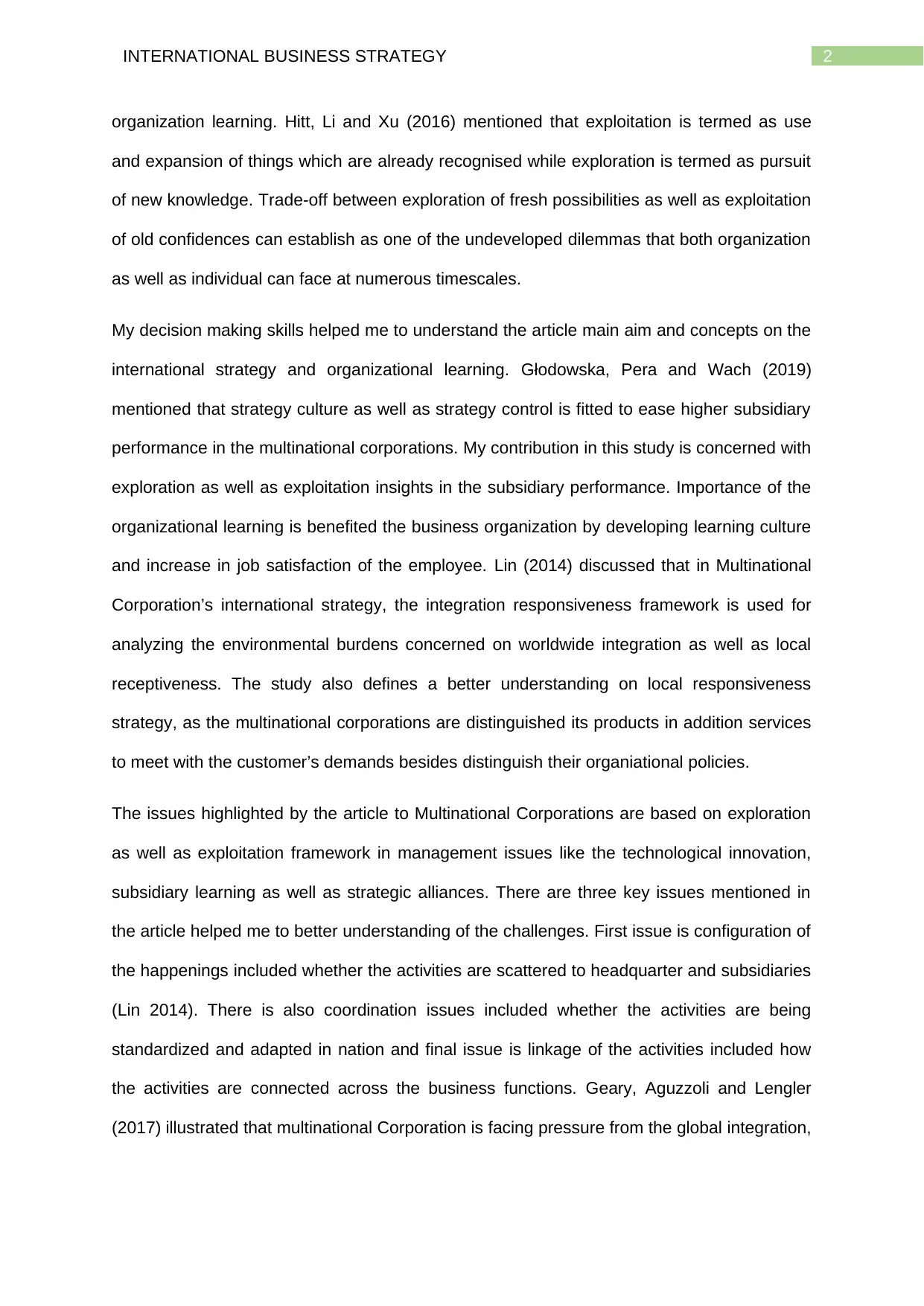
2INTERNATIONAL BUSINESS STRATEGY
organization learning. Hitt, Li and Xu (2016) mentioned that exploitation is termed as use
and expansion of things which are already recognised while exploration is termed as pursuit
of new knowledge. Trade-off between exploration of fresh possibilities as well as exploitation
of old confidences can establish as one of the undeveloped dilemmas that both organization
as well as individual can face at numerous timescales.
My decision making skills helped me to understand the article main aim and concepts on the
international strategy and organizational learning. Głodowska, Pera and Wach (2019)
mentioned that strategy culture as well as strategy control is fitted to ease higher subsidiary
performance in the multinational corporations. My contribution in this study is concerned with
exploration as well as exploitation insights in the subsidiary performance. Importance of the
organizational learning is benefited the business organization by developing learning culture
and increase in job satisfaction of the employee. Lin (2014) discussed that in Multinational
Corporation’s international strategy, the integration responsiveness framework is used for
analyzing the environmental burdens concerned on worldwide integration as well as local
receptiveness. The study also defines a better understanding on local responsiveness
strategy, as the multinational corporations are distinguished its products in addition services
to meet with the customer’s demands besides distinguish their organiational policies.
The issues highlighted by the article to Multinational Corporations are based on exploration
as well as exploitation framework in management issues like the technological innovation,
subsidiary learning as well as strategic alliances. There are three key issues mentioned in
the article helped me to better understanding of the challenges. First issue is configuration of
the happenings included whether the activities are scattered to headquarter and subsidiaries
(Lin 2014). There is also coordination issues included whether the activities are being
standardized and adapted in nation and final issue is linkage of the activities included how
the activities are connected across the business functions. Geary, Aguzzoli and Lengler
(2017) illustrated that multinational Corporation is facing pressure from the global integration,
organization learning. Hitt, Li and Xu (2016) mentioned that exploitation is termed as use
and expansion of things which are already recognised while exploration is termed as pursuit
of new knowledge. Trade-off between exploration of fresh possibilities as well as exploitation
of old confidences can establish as one of the undeveloped dilemmas that both organization
as well as individual can face at numerous timescales.
My decision making skills helped me to understand the article main aim and concepts on the
international strategy and organizational learning. Głodowska, Pera and Wach (2019)
mentioned that strategy culture as well as strategy control is fitted to ease higher subsidiary
performance in the multinational corporations. My contribution in this study is concerned with
exploration as well as exploitation insights in the subsidiary performance. Importance of the
organizational learning is benefited the business organization by developing learning culture
and increase in job satisfaction of the employee. Lin (2014) discussed that in Multinational
Corporation’s international strategy, the integration responsiveness framework is used for
analyzing the environmental burdens concerned on worldwide integration as well as local
receptiveness. The study also defines a better understanding on local responsiveness
strategy, as the multinational corporations are distinguished its products in addition services
to meet with the customer’s demands besides distinguish their organiational policies.
The issues highlighted by the article to Multinational Corporations are based on exploration
as well as exploitation framework in management issues like the technological innovation,
subsidiary learning as well as strategic alliances. There are three key issues mentioned in
the article helped me to better understanding of the challenges. First issue is configuration of
the happenings included whether the activities are scattered to headquarter and subsidiaries
(Lin 2014). There is also coordination issues included whether the activities are being
standardized and adapted in nation and final issue is linkage of the activities included how
the activities are connected across the business functions. Geary, Aguzzoli and Lengler
(2017) illustrated that multinational Corporation is facing pressure from the global integration,
⊘ This is a preview!⊘
Do you want full access?
Subscribe today to unlock all pages.

Trusted by 1+ million students worldwide
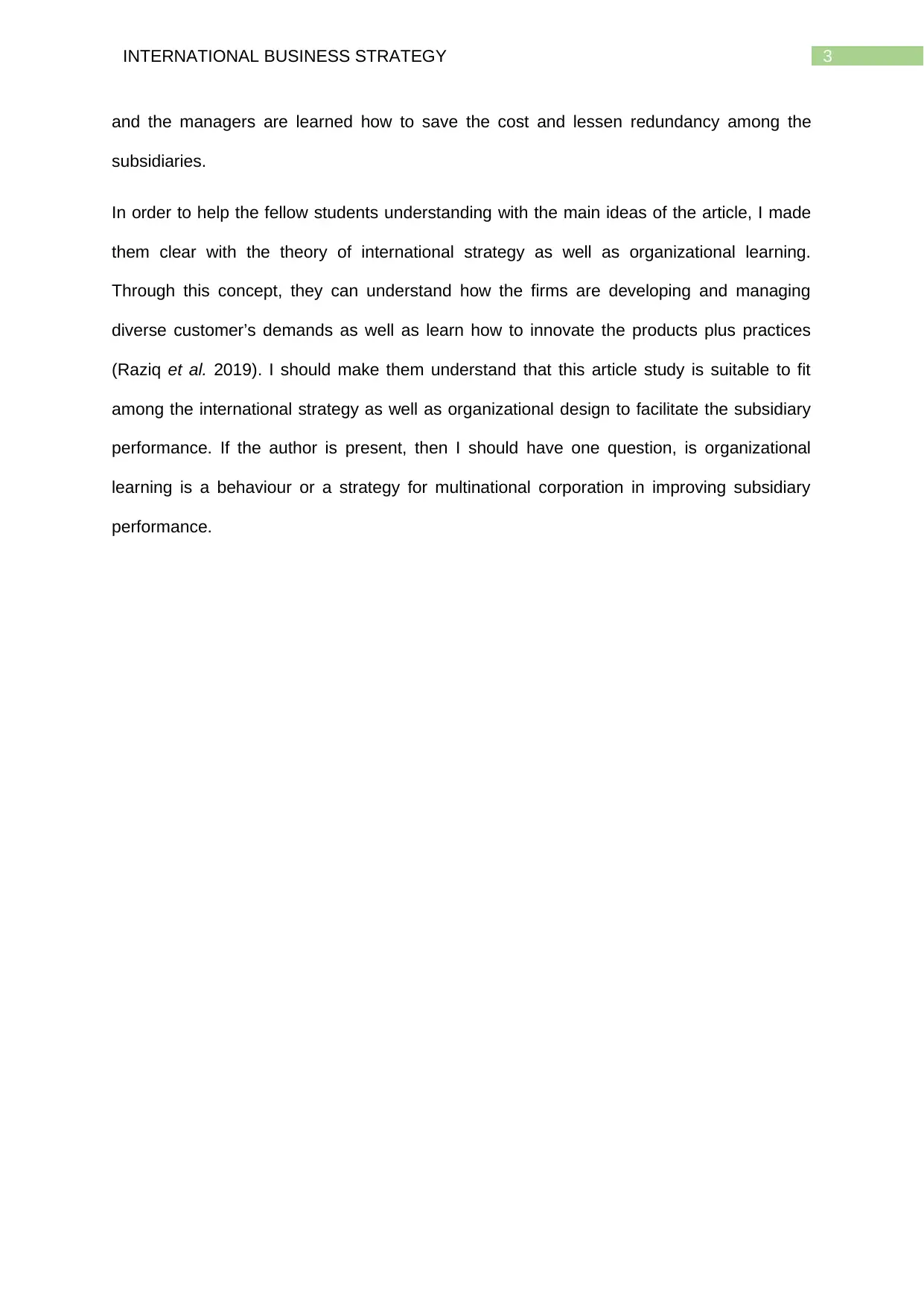
3INTERNATIONAL BUSINESS STRATEGY
and the managers are learned how to save the cost and lessen redundancy among the
subsidiaries.
In order to help the fellow students understanding with the main ideas of the article, I made
them clear with the theory of international strategy as well as organizational learning.
Through this concept, they can understand how the firms are developing and managing
diverse customer’s demands as well as learn how to innovate the products plus practices
(Raziq et al. 2019). I should make them understand that this article study is suitable to fit
among the international strategy as well as organizational design to facilitate the subsidiary
performance. If the author is present, then I should have one question, is organizational
learning is a behaviour or a strategy for multinational corporation in improving subsidiary
performance.
and the managers are learned how to save the cost and lessen redundancy among the
subsidiaries.
In order to help the fellow students understanding with the main ideas of the article, I made
them clear with the theory of international strategy as well as organizational learning.
Through this concept, they can understand how the firms are developing and managing
diverse customer’s demands as well as learn how to innovate the products plus practices
(Raziq et al. 2019). I should make them understand that this article study is suitable to fit
among the international strategy as well as organizational design to facilitate the subsidiary
performance. If the author is present, then I should have one question, is organizational
learning is a behaviour or a strategy for multinational corporation in improving subsidiary
performance.
Paraphrase This Document
Need a fresh take? Get an instant paraphrase of this document with our AI Paraphraser
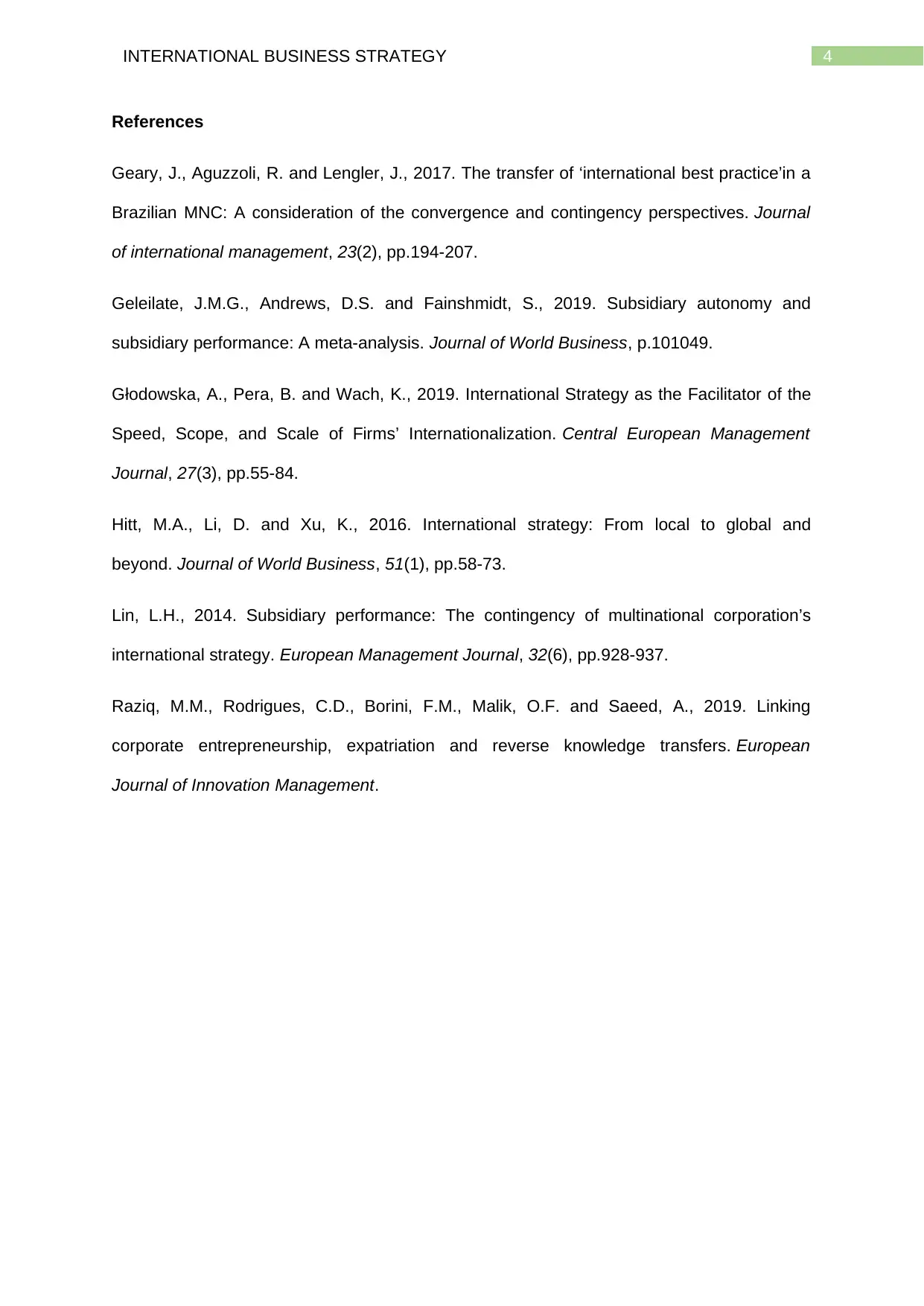
4INTERNATIONAL BUSINESS STRATEGY
References
Geary, J., Aguzzoli, R. and Lengler, J., 2017. The transfer of ‘international best practice’in a
Brazilian MNC: A consideration of the convergence and contingency perspectives. Journal
of international management, 23(2), pp.194-207.
Geleilate, J.M.G., Andrews, D.S. and Fainshmidt, S., 2019. Subsidiary autonomy and
subsidiary performance: A meta-analysis. Journal of World Business, p.101049.
Głodowska, A., Pera, B. and Wach, K., 2019. International Strategy as the Facilitator of the
Speed, Scope, and Scale of Firms’ Internationalization. Central European Management
Journal, 27(3), pp.55-84.
Hitt, M.A., Li, D. and Xu, K., 2016. International strategy: From local to global and
beyond. Journal of World Business, 51(1), pp.58-73.
Lin, L.H., 2014. Subsidiary performance: The contingency of multinational corporation’s
international strategy. European Management Journal, 32(6), pp.928-937.
Raziq, M.M., Rodrigues, C.D., Borini, F.M., Malik, O.F. and Saeed, A., 2019. Linking
corporate entrepreneurship, expatriation and reverse knowledge transfers. European
Journal of Innovation Management.
References
Geary, J., Aguzzoli, R. and Lengler, J., 2017. The transfer of ‘international best practice’in a
Brazilian MNC: A consideration of the convergence and contingency perspectives. Journal
of international management, 23(2), pp.194-207.
Geleilate, J.M.G., Andrews, D.S. and Fainshmidt, S., 2019. Subsidiary autonomy and
subsidiary performance: A meta-analysis. Journal of World Business, p.101049.
Głodowska, A., Pera, B. and Wach, K., 2019. International Strategy as the Facilitator of the
Speed, Scope, and Scale of Firms’ Internationalization. Central European Management
Journal, 27(3), pp.55-84.
Hitt, M.A., Li, D. and Xu, K., 2016. International strategy: From local to global and
beyond. Journal of World Business, 51(1), pp.58-73.
Lin, L.H., 2014. Subsidiary performance: The contingency of multinational corporation’s
international strategy. European Management Journal, 32(6), pp.928-937.
Raziq, M.M., Rodrigues, C.D., Borini, F.M., Malik, O.F. and Saeed, A., 2019. Linking
corporate entrepreneurship, expatriation and reverse knowledge transfers. European
Journal of Innovation Management.
1 out of 5
Related Documents
Your All-in-One AI-Powered Toolkit for Academic Success.
+13062052269
info@desklib.com
Available 24*7 on WhatsApp / Email
![[object Object]](/_next/static/media/star-bottom.7253800d.svg)
Unlock your academic potential
Copyright © 2020–2025 A2Z Services. All Rights Reserved. Developed and managed by ZUCOL.




